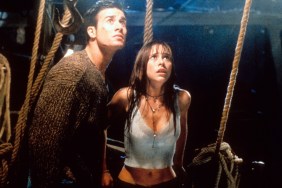Cast:
Joaquin Phoenix as Himself
Directed by Casey Affleck
Analysis
Anyone hoping to walk away from “I’m Still Here” confident in their resolve to either laugh at or laugh with Joaquin Phoenix’s languished attempt at self-discovery is apt to find disappointment. If it’s a
farce, there are no winks and there are no punch lines. If it’s all real, there’s no epiphany and no salvation. This is a dark, cynical look a character in the midst of a nihilistic downward spiral and the cinematic result is nothing short of fascinating. Imagine a falling star counterpoint to DA Pennebaker’s “Don’t Look Back” as scripted by Bret Easton Ellis (an intentional nod or not, Phoenix even, at one point, scrambles desperately against doors marked “This is not an Exit”.)
“[W]e must be careful about what we pretend to be,” Kurt Vonnegut wrote in “Mother Night,” “…[because] we are what we pretend to be.”
Whether or not a similar notion informed Casey Affleck’s filmmaking process is unknown, but it certainly sits in the mind of the audience. Ours is a culture fascinated by the unwritten rules of celebrity worship, extending beyond just film or even entertainment to politics and religion. We love a scandal and hide a smile when the pious stumble. Our schadenfreude is empowering in that, having identified the fallen, we also have it in our collective power to provide them grace. What, then, is easier to forgive? That Phoenix’s path was forged through chemical dependency, depression or madness, or that he’s pulling a practical joke on the entire world? If it is the former (as it certainly has been in the past), isn’t the joke the bigger transgression? Does art, here, become of greater consequence than reality?
Technically, “I’m Still Here” has some troubles. It’s sloppy, repetitive and disgustingly self-indulgent. It’s also quite probably all these things on purpose, but, regardless, the questions that it raises are so wildly intangible that it would be, even unintentionally, of value. Furthering the “Don’t Look Back” comparison, Pennebaker has famously commented that he felt he didn’t accurately capture Dylan on celluloid. That once the camera started to run, Dylan would adopt a completely different on-screen persona. In this, the “Don’t Look Back” character of Bob Dylan is not at all that far removed from the “I’m Still Here” character of Joaquin Phoenix. They’re both loud, obnoxious rebel wannabes fueled by substance abuse and terrified by the uncontrollable aspects of their fame. Dylan’s final shot in the back seat of a car lingers on his unreadable face and reminds us that he’s very much in the moment, moving forward. Phoenix’s on-screen story has a similar concluding aesthetic, but heads hauntingly in the opposite direction. If life is truly sad and empty and you’ve done your best to tear it down and then thrown it out for the world to judge you at your worst, what happens after discussion subsides and all the decisions are reached? What if, when words are spent, youre still here?
An artistic experiment that runs far, far longer than a 108 minute running time, “I’m Still Here” is a modern Roman holiday that chillingly frames existential pain within a Warholian nightmare. Love it or hate it, it’s a work that will stick with you.










